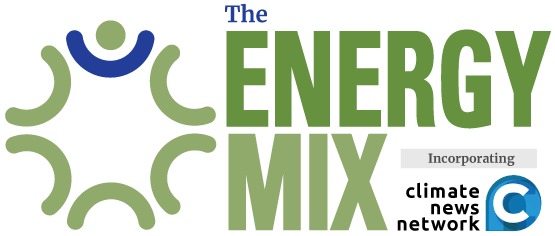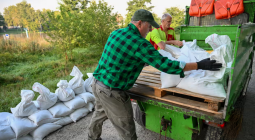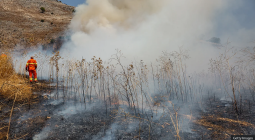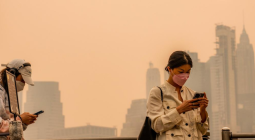‘Communicating Fire’ Raises the Alarm on Climate Change: Vaillant
“Communicating fire” is an apt figure of speech for raising the alarm about climate change and its impacts, but the aftermath of a climate disaster is the worst time to expect a response from the people who lived through it, author and journalist John Vaillant said in a feature interview Thursday.
Vaillant, whose 2023 book “Fire Weather: The Making of a Beast” chronicled the devastating wildfire that destroyed much of Fort McMurray, Alberta in 2016, was speaking just hours before delivering a lecture on climate communication and climate denial hosted by the Institute for Environment, Conservation and Sustainability at the University of Toronto.
Fire is a “really charismatic symptom” of climate change, Vaillant told The Energy Mix. “We are hardwired to respond to fire and notice it, in the same way we’re hardwired to notice guns, and sudden movement in the person sitting next to you.”
Humanity’s connection to fire dates back before Homo sapiens, he said. But more recently, the fossil fuel era has “created an illusion of mastery over fire that is starting to blow back on us in some very intense ways. And now Hurricane Helene is basically about to wipe out a bunch of flood surge records in South Florida, pretty much as we’re speaking to each other.”
The larger issue that connects this week’s storm and the wildfire known as The Beast is the “super-abundance of CO2 in our atmosphere, generated by human activity,” Vaillant added. “Fire is the language I have at my disposal to communicate this in a way that seems to get people’s attention,” the right balance of “drama, narrative, history, useful information, and accessible science so we can orient ourselves in time, and in the state of the world as it is becoming.”
Another Narrative
But very little of that narrative is likely to resonate with resource towns and remote communities like Fort McMurray that are often most vulnerable to the impacts of climate change.
“They don’t read the book, they don’t come to the talks, and they’ve developed another coping mechanism that probably has another narrative attached to it,” he said. Western Canada “is certainly aware of water issues, they’re dealing with a multi-year drought, now they’ve got crop failures and water shortages, they have frighteningly low rivers that used to be abundant, and they obviously have intense fire issues.” All of which plunges affected community into a very different reality—most recently for Fort McMurray this past May, when about one-quarter of the community was evacuated due to wildfires and at least two or three oil sands companies moved thousands of workers to safety on a moment’s notice.
“Where do they go? And how do they and their partners live with this continuing reality?” Vaillant asked. “The PTSD (post-traumatic stress disorder) and the anxiety are real, and they’re obviously justified given the types of fires we’ve had,” even with death tolls in Canada that are so far a tiny fraction of what many other countries have seen.
But the other side of the story is the expectation in a company town that local residents will be loyal to the industry the pays their salaries. “When you work in the fossil fuel industry, you have committed yourself. You’ve also committed your finances, and by extension, your family,” he said. “All your dependents are tied up in that, and that’s where our loyalties are—it may not be to the company or the job, but it’s absolutely to our families and our larger community.”
Which makes it hard to criticize from within: “To rag on it, to question it, to express doubt about it, undermines the social fabric, and you can risk your own social standing and security if you start being a squeaky wheel.”
The Gravy Train Runs Out
Neither the impacts of climate disasters nor the social dynamics he described are unique to Fort McMurray, Vaillant stressed. On a recent visit to Houston, one of the epicentres of the U.S. oil and gas industry, he said he’d seen a massive metal highway billboard “folded over like a yard sign” after Hurricane Beryl roared through town, combining with a severe heat wave to put about 2.7 million people in danger. While he was there, he learned that Houston had lost 60,000 oil and gas jobs in the last decade and that global oil giant Shell was cutting another 20% of its work force this year, just as Calgary-based Suncor Energy eliminated 1,500 jobs and axed its renewable energy division while taking in record profits.
“You can see where the priority is,” he said. “They’re looking after shareholders and investors and the people who stand to generate bonuses from being employed there. They’re circling the wagons, and that creates a real precarity in the work force and another incentive not to ask questions, not to be critical. Because this gravy train is going to run out in five years, so I’m going to run the wheels off the thing.”
Vancouver Catches a Break
A different kind of apprehension took hold in August when two wood-framed condominiums caught fire in Vancouver’s Dunbar Village, causing panic and mayhem just a few kilometres from Vaillant’s home. Then the fire spread, with embers landing blocks away in the 900-hectare Pacific Spirit Regional Park.
“Bystanders and firefighters screamed as a 30-metre, 50-tonne construction crane engulfed in flames toppled over in terrible, cinematic slow-mo across a major crosstown thoroughfare,” he later wrote for the Globe and Mail. “On its way down, it took out power lines and trolley wires, and crushed the house across the street, trapping an occupant. It is a miracle no one was killed.”
And it could have been so much worse, he told The Mix.
Though the Vancouver fire department never responded to Vaillant’s Globe and Mail story, its resources were “overwhelmed that night,” he said. “If one more condo had caught fire with the same intensity that those two did, they’d have been bringing trucks in from Chilliwack, or maybe they would have cleaned out Surrey’s fire department.” If the fire had grown into a conflagration and evacuation, it would have been a full-scale disaster—a real possibility if the original building had caught fire during a heat wave.
In the end, the experience showed that “the conditions for conflagrations are now possible in Vancouver. Between heat domes and high winds and the already really dense housing stock, much of which is kindling dry, we’re rolling the dice all the time.”
Understanding Shock and Grief
And yet very little of that matters—or can be expected to matter—to people who’ve just lost everything in a climate disaster, or who are still living through the experience.
“When you are in the throes of trying to process this incredible trauma, you have no bandwidth,” Vaillant said. “You’re really focused on the tightest priorities—your safety, your family’s safety, your immediate future—and it is not the best time for analysis within that community.”
There’s “a way to be sympathetic and honest” about a place like Lytton, British Columbia burning to the ground in minutes after four straight days of 50°C temperatures, even with the town still waiting to be rebuilt. But more than three years later, “they may still have no bandwidth if they’re still couch surfing, or living in a motel, or living who knows what or where.”
He compared the experience to a school shooting in the United States, “where you have a bunch of traumatized people who are mourning what they’ve lost.” People may feel the need to move away, or just want their old lives back, to feel safe again. “These are the fundamental building blocks of any society, of any mentally healthy person. And when you start pulling those blocks out, things get really crazy.”
Against that backdrop, “what’s amazing is that the needle is moving,” Vaillant said, with countries like Colombia, Germany, and China accelerating the shift out of fossil fuels and Russia’s war on Ukraine speeding up the transition across the European Union.
“Incredible progress is being made, especially around energy,” he said. The transition “is totally possible, just as it is to decouple economic growth from CO2. So there are many paths forward.”
Cover photo: peter_pdp/Instagram





